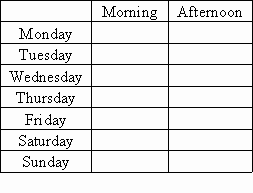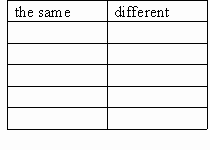题目内容
A:1_______on weekends?
B:I usually exercise.
A:2_________________________________________?
B:Oh,I exercise about five times a week.
A:That's nice! You like sports.3_____________?
B:I like basketball best.4___________________________.
A:Great! Basketball stars are popular.
5___________________________________________?
B:I like Michael Jordan best.He's so great.
试题答案
1、1. What do you usually do
2. How often do you exercise for a week
3. Which sport do you like best/ Which sport is your favorite / Which is your favorite sport
4. I want to be a basketball star/ I wish to become a basketball star
5. What do you think of Michael Jordan/ How do you like Michael Jordan.
A:1_______on weekends?
B:I usually exercise.
A:2_________________________________________?
B:Oh,I exercise about five times a week.
A:That's nice! You like sports.3_____________?
B:I like basketball best.4___________________________.
A:Great! Basketball stars are popular.
5___________________________________________?
B:I like Michael Jordan best.He's so great.
查看习题详情和答案>>用How often do you…?Do you…?或What do you usually…?给下列答句提问。
1.A:________
B:Yes, I often exercise on weekends.
2.A:________
B:Well, I usually play basketball on Saturdays and volleyball on Sundays.
3.A:________
B:No. I never watch TV after school.
4.A:________
B:I don't exercise very often at all.
5.A:________
B:I sometimes play tennis in my free time.
查看习题详情和答案>>完成对话下面是Bill与Katrina的一段对话,对话顺序是正确的,请选择合适的话语,使对话完整。
Bill:________(1)
a.May I ask you some questions? b.Can I help you?
Katrina:________(2)
a.Yes, please. b.Hold on, please.
Bill:________(3)
a.What's it like? b.What's your favorite exercise?
Katrina:________(4)
a.I usually play basketball on weekends. b.I like jogging.
Bill:________(5)
a.How often do you jog? b.How many hours do you play basketball?
查看习题详情和答案>>
| |||||||||||||||||||||||||||||||||||||||||||||||||||||||||||||||||||||||||
学习语言的关键在于应用。请你根据提示词语及句型,踊跃参加以下活动吧!相信你一定是佼佼者!
A.Who is Dr. Know?
Choose a problem from the list below. Ask your classmates for advice. Who gives the best advice is “Dr. Know”.
提示词语及句型:
1)Problems: toothache, stressed out, hungry, backache, cold, sorethroat, tired, headache, thirsty
2)What's the matter?
You should (shouldn't)…
3)lie down, go to bed, see a dentist, listen to music, go out, drink, eat, have a rest, exercise…
B.Who is the healthiest?
Make a survey about what some of your classmates do and how often they do on weekends. Tell it to your classmates. Take a vote:
Who is the healthiest?
提示词语及句型:
1)always, usually, often, sometimes, hardly ever, never, watch TV, read books, exercise, shop, surf the Internet, play football
2)What do you usually do on weekends?
How often do you watch TV?
C.Vacation Dreams
Imagine your dream vacation. On a piece of paper, write what you are doing for vacation, when you are going and how long you are staying there. Put your paper in a bag, then take another paper from the bag. Find the students who has your paper.
提示词语及句型:
1)go camping, go bike riding, go sightseeing, take walks, visit, on Monday, tomorrow, the day after tomorrow, on the 12th, next week, for a week, for three days
2)Where are you doing for vacation?
What are you doing for vacation?
When are you going?
How long are you staying there?
D.Find someone who…
Ask three of your classmates questions. Write their answers in the table below. The first student to fill in all the blanks wins.
提示词语及句型:
1)walk to, ride my bike, take the bus (train, subway), get to school
2)How do you get to school?
How long does it take?
How far is it from…to…?

E.Plan a party
Write everything you have to do next week, and fill in the table below. Choose a day and time to have a party. Then invite classmates to your party.
提示词语及句型:
1)study, have a lesson, visit, help, play football, go to the movies, watch TV
2)Can you come to my party?
I have to…
What are you doing on Tuesday?

F.The same and different
Write your name on a piece of paper and put it in a bag. Take a paper from the bag to find a partner. You have three minutes to make a list of things that are the same and different between you and your partner. The pair with the most items wins.
提示词语及句型:
1)tall, quiet, athletic, serious, intellectual, thin, funny
2)He is taller than me.
We are both girls.
